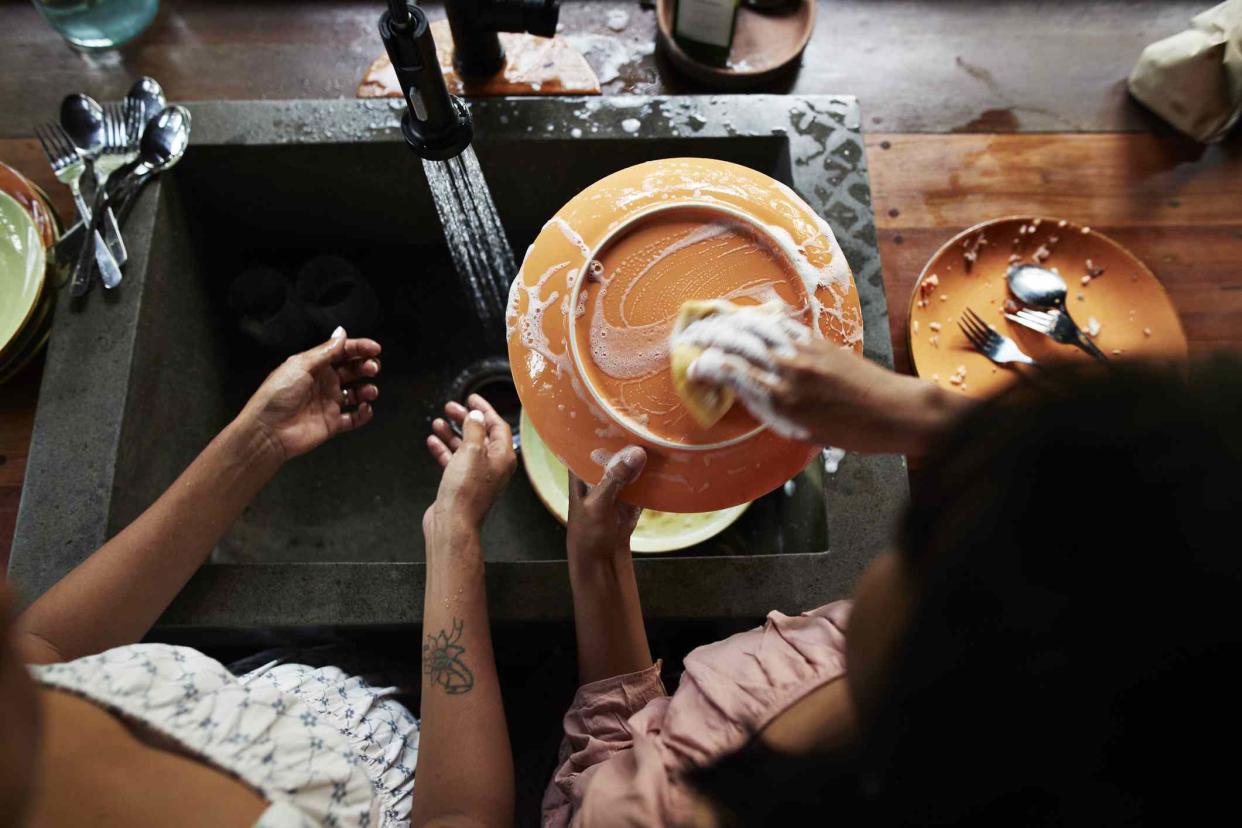10 Things You Should Never Wash With Soap, According to Pros

Klaus Vedfelt / Getty Images
When you’re in a deep-cleaning frenzy, it can be tempting to tackle everything with soap. But soap isn’t the best fit for every item in your home, and it can even cause further damage in some cases. Here are some common household objects that shouldn’t be cleaned with soap (and how you can wash them instead).
Cast Iron Skillets
Cast iron skillets are a must-have tool for any home cook, and they require special care to be long-lasting. When cleaning a cast iron skillet, you shouldn’t rely on copious amounts of soap, says Angela Rubin, content manager at Hellamaid.
“Soap can break down the seasoning on cast iron, which is essential for its non-stick properties and rust prevention,” Rubin says.
As an alternative method, Rubin recommends arming yourself with a stiff brush, hot water, and Kosher salt.
Stainless Steel
Stainless steel is a popular choice for kitchen appliances, partially because of how easy it is to clean. All you need to clean stainless steel is a towel, microfiber cloth, and some water—but no soap.
“Stainless steel is very porous, and soaps can leave behind residue in the small crevices that are difficult to rinse away completely,” says Max Mattes, restoration expert and owner at Max Paint & Restoration in Louisville, Kentucky. “Over time, this buildup can cause dullness or discoloration on the surface.”
Wood Cutting Boards
Don’t put that wooden cutting board in the dishwasher. The soap and water exposure will, over time, cause the wood to split and crack apart, says Lina DaSilva, founder of Toronto Shine Cleaning.
But it’s still important to clean and disinfect your cutting board after every use, and this can be done by wiping it with a vinegar and water mixture.
Knives
Like cutting boards, knives can be damaged by repeated soap and water exposure. Specifically, DaSilvia says, the suds cause the blades to become corroded and dulled. To get your knives clean, simply (and safely) wipe them with a damp cloth and dry them immediately with a towel.
Hardwood Floors
Despite their reputation for durability, cleaning hardwood floors must be done correctly to prevent damage. Liran Koren, co-founder of Luxury Property Care in Boca Raton, Florida, says to steer clear of soap when your hardwood floors need a scrub.
“Dish soap might remove the protective oils in the wood, leaving it susceptible to damage,” Koren says. “Additionally, the chemicals in dish soap can harm the floor finish and speed up wear-and-tear.”
Instead, use a commercial hardwood floor cleaner that’s designed to be gentle on the material. Koren also recommends mixing white vinegar or lemon juice with water for an effective and gentle cleaning solution.
Coffee Machines
Unless you want a soapy aftertaste in your morning coffee, don’t clean your coffee machine with soap.
“Removing soap completely from the intricate components poses a challenge, and there may be some residue left behind,” Koren says. “Residual soap can affect the taste of your coffee and may lead to issues like foaming or bubbling in the water used for brewing.”
A more effective alternative: mixing equal parts water and white vinegar, Koren says. This will dissolve mineral deposits and get your coffee maker clean, without any lingering suds.
Electronics
You’re probably not going to try to wash your TV with soap, but you also shouldn’t use it for other electronic gadgets, like keyboards or remote controls. Soap and water can seep into these sensitive systems, damaging the components within and leading to malfunctioning, says Rubin.
She recommends using special cleaning solutions designed for electronics. Dampen a microfiber cloth with the cleaning solution and gently wipe the surfaces. Just make sure the cloth isn’t too damp—you don’t want any liquid dripping into your electronics. And remember to always unplug electronics before cleaning.
Painted Walls
Though your walls might not need to be scrubbed down often, it’s important to know how to properly clean them so you don’t damage your paint. And surprise, surprise, using soap is not the best method.
“Soap residue can leave streaks or damage paint,” says Karina Toner, operations manager at Spekless Cleaning in Arlington, Virginia.
In place of soap, use dry or slightly damp microfiber cloths to spot clean your walls as needed.
Leather Furniture
If you spill on your leather sofa, don’t reach for the soap—this can dry out and crack the leather, DaSilva says. Instead, use a cloth dampened with a mild, leather-specific cleaner for big messes. For lighter touch-ups, dust your leather furniture with a dry cloth.
Granite and Marble
Natural stone countertops, like granite and marble, are other household additions that should never be cleaned with soap. The reason: “The alkaline pH levels can etch into the stone over multiple cleanings; this can lead to unsightly hazing or spotting,” Mattes says.
Stick to a basic microfiber cloth for cleaning granite countertops and a neutral pH stone cleaner for cleaning marble countertops.
Read Next: 10 Things You Should Never Put in a Washing Machine
Read the original article on The Spruce.
